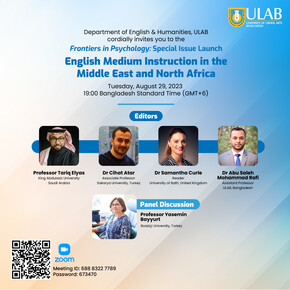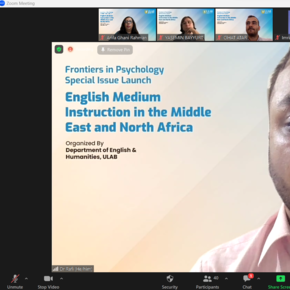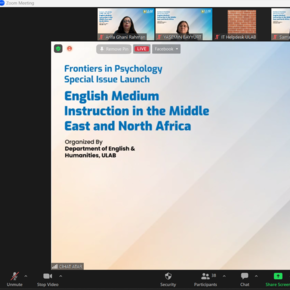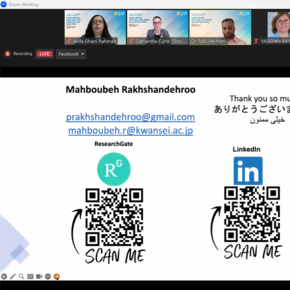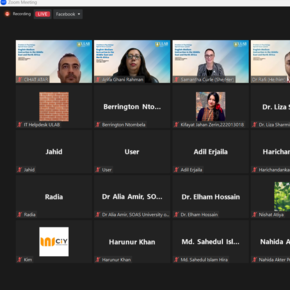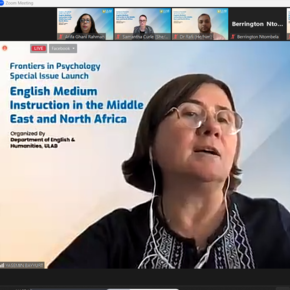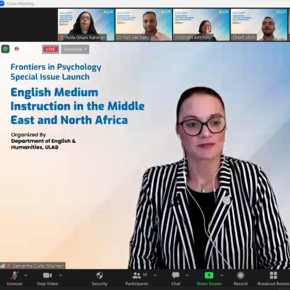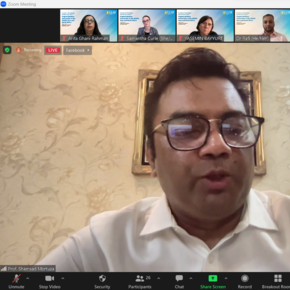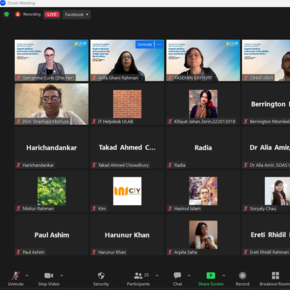ULAB Launches Special Issue of Frontiers in Psychology Journal
On August 29, 2023, the Department of English and Humanities (DEH), ULAB, organized a virtual launching ceremony for a Special Issue of Frontiers in Psychology, a SCOPUS-indexed journal with an impact factor of 3.8. Titled “English Medium Instruction in the Middle East and North Africa,” this Special Issue addresses the issues and opportunities related to research on English Medium Instruction (EMI). Hosted by Dr. Abu Saleh Mohammad Rafi, Assistant Professor, DEH, ULAB, one of the editors of this Special Issue, the program was joined in by his co-editors Dr. Cihat Atar, Associate Professor, Sakarya University, Turkey; and Dr. Samantha Curle, Reader, University of Bath, UK. The lead editor is Professor Tariq Elyas, King Abdulaziz University, Saudi Arabia. Authors of three of the eight articles in the journal also joined the program. Professor Yasemin Bayyurt, Boaziçi University, Turkey, a specialist in Applied Linguistics, was present as the Panel Discussant.
In his welcome address, Professor Imran Rahman, Vice Chancellor, ULAB, stated that, as a marker of internationalization and quality education, English medium instruction (EMI) has become widespread in higher education institutions in countries where English is not the native tongue. Almost every university appears compelled to offer programs in English, whether at the postgraduate or undergraduate levels. Private universities in Bangladesh are not an exception to this trend. Economic, social, and political forces, as well as educational factors, drive the expansion of English medium instruction here. However, implementing EMI comes with a plethora of challenges, including students’ and teachers’ lack of English proficiency to benefit from EMI, lack of appropriate classroom materials, and teacher education programs. Prof. Rahman felicitated the editors of the journal for their research initiative in this area and expressed his delight that ULAB has been a part of it.
Dr. Cihat Atar then spoke about the rationale for the Special Issue. Speaking primarily from the perspective of Turkey and the Middle East, Dr. Atar emphasized how there is a lack of research on the nature of EMI, despite the challenges and concerns that have arisen with its globalization. He mentioned how studying at higher institutions that used EMI has become a prestige issue and is associated with better jobs.
Dr. Samantha Curle provided the audience with the aims of the Special Issue and the process by which it was conceptualized and developed. She stated that the Special Issue seeks to generate new insights for practical recommendations for educators, policy makers, and academic institutions. It provides a comprehensive scholarly examination of the impacts and challenges of EMI within the Middle Eastern and North African regions that have pedagogic and sociolinguistic implications for the stakeholders.
The authors of three of the articles then presented the highlights of their contributions. Dr. Iman Oraif gave an overview of her paper that had focused on the context of Saudi Arabia. Her paper was titled “Using English Medium Instruction to Teach a General Course in a College of Business and Management.” Dr. Mahboubeh Rakhshandehroo discussed her co-authored paper on “The Attitude of Iranian Students and Instructors toward Implementing EMI through Virtual Exchange.” Following this, Dr. Berrington Ntombela introduced his paper on “The Sociolinguistic Problems of English Medium Instruction in the Middle East and North Africa: Implications for Epistemic Access” and discussed his experiences of the issues concerning EMI, particularly in the context of South Africa.
Following the insightful discussions by the authors, Professor Yasemin Bayyurt acknowledged the importance of research on EMI. She emphasized the necessity of contextualized research, deeming it the best starting point for understanding various perspectives from students and teachers, and encouraged initiatives that promote such research. She spoke of taking into account the history of a language to guide research, which is also essential to be done by non-native speaking countries like those who contributed to the journal under discussion.
A lively question and answer session ensued after the discussions and the editors of the Special Issue provided responses to the points of concern raised by the audience.
Professor Shamsad Mortuza, Professor, DEH, and Special Advisor, ULAB Board of Trustees, gave the closing remarks by firstly congratulating the editors and authors of the journal on their initiative. He shared his experiences, as Director of the International Office, DU, with the international students whose faculty members often resorted to Bangla only, whereas at universities like ULAB, English is the medium of instruction. So two systems run parallel in the same country. He also suggested that English should be localized to add value to it as a language and to aid better understanding because, without this, we cannot have a sustainable future.
The program, attended by over fifty scholars from home and abroad, ended with a vote of thanks from Associate Professor Arifa Ghani Rahman, Head of the Department of English and Humanities.
The full video of the launching ceremony is available at the Department of English and Humanities, ULAB, YouTube channel.
Report by Ereti Rhidil Rahman, a BA in English student at the Department of English and Humanities, ULAB

